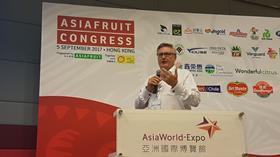
Want to expand into China but nervous about intellectual property?
The topic was on the agenda at the Asiafruit Congress in Hong Kong on 5 September, where Beijing-based Matthew Murphy of legal consultancy MMLC Group tackled the issue.
Stories of counterfeit fruit, plant breeder rights infringements and brand damage can make the move seem daunting, but Murphy said it was a case of being prepared, monitoring the market and keeping an eye on infringements through formal and informal channels.
“The short-term view is that once China starts importing things, it’ll start counterfeiting them,” Murphy said. “But people are travelling more and bringing things back into China anyway.”
John Morton, managing director of New Zealand-based intellectual property management firm Shennong Variety agreed: “There is a lot of scepticism [around working in China], but there are the companies that are prepared to come [into China] and those who are not – securing variety rights is first step of a long process.
“You need to plan through to commercialisation,” Morton said. “The key is establishing a company structure from working with plant breeders overseas to securing contracts in China, and working within China to improve orchard performance.”
Shennong Variety, which operates in China, recently secured investment from leading Chinese importer Joy Wing Mau, which Morton said gives them the marketing channel to sell the fruit, and get the revenue that plant breeders expect.
Alice Wang, manager of temperate fruit division for the world’s largest apple juice concentrate producer, Haisheng, offered her perspective from within China.
In 2011, Wang began working on the development of Haisheng’s farming business, which included importing high-density apple planting systems and new apple varieties into China to grow fresh apples for the domestic market.
“We found limited apple varieties in China when we started growing – just Fuji and Gala,” Wang explained. “So we started [importing and] planting other varieties and after six years, we have had good results with more choice [available to consumers], even in second-tier cities. “
Wang said they mainly import ‘open’ apple varieties to plant at Haisheng’s orchards, but have also secured rights to grow protected varieties such as Honeycrisp.
“[Haisheng] spent two years trying to negotiate exclusivity for Honeycrisp in China and trying to change the reputation of Chinese growers,” Wang said.
“The Chinese government has opened to fresh fruit imports, so in near future, we expect the Chinese government will open the door to importing the plants and growing locally.”



